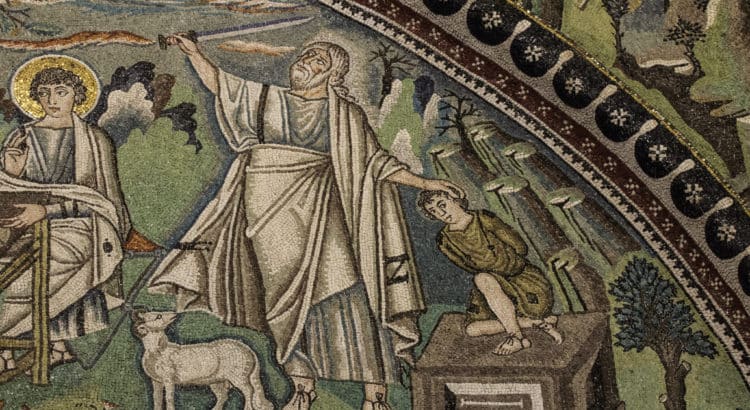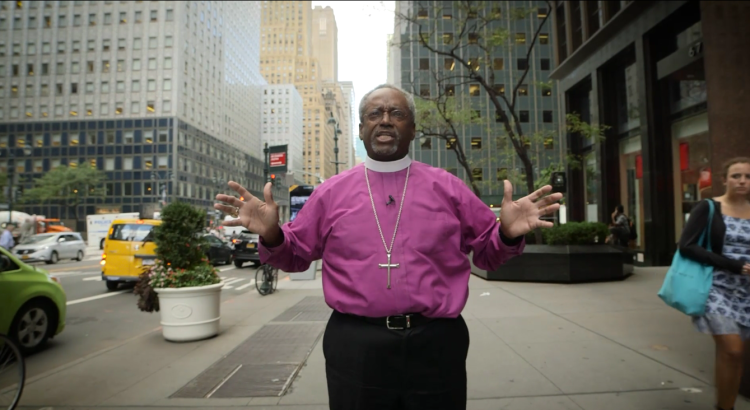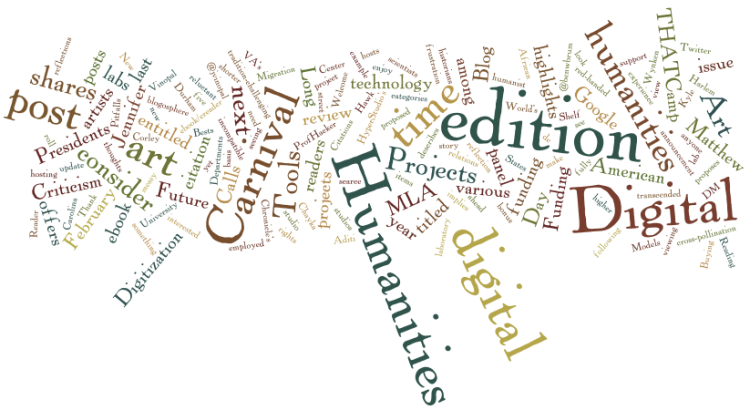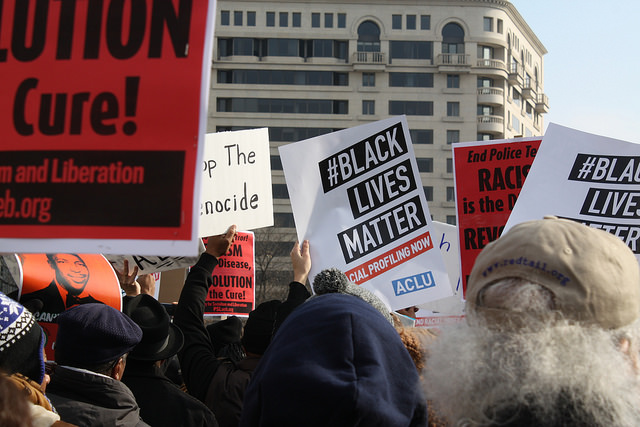Image credit: “Binding of Isaac” by Lawrence OP via Flickr (CC BY-NC-ND 2.0)
Fourth Sunday after Pentecost:
Genesis 22:1-14; Psalm 13; Romans 6:12-23; Matthew 10:40-42
During my first year of seminary, my classmates and I went on retreat to a remarkable intentional community in the heart of Virginia’s capital.
The founder of Richmond Hill is a guy named Ben. He’s an institution in Richmond politics as well as its faith community. He’s a prophet in the Hebrew Scriptures’ sense of that term: bold, truthful in the face of others’ discomfort, a beacon of righteous moral clarity for better and perhaps occasionally for worse.
The whole weekend experience had a profound effect on many of us. In particular, Ben said something about discernment that weekend that has always stuck with me.
Along with all the important caveats that go along with a statement like this, he said, “Sometimes, sometimes, it’s very important to make a different decision from what your priest is telling you, or what your therapist is telling you, or what your friends are telling you.”
His point was that for our faith to do its most vital counter-cultural work, we sometimes have to go against prevailing wisdom, the formal and informal structures of power and authority, convention and convenience, recognition and prestige.
In other words, Ben said: “You’re going to have to make some difficult and unpopular decisions.”
I probably remember the whole thing so vividly because I have a streak of overly stark moral seriousness, a kind of black-and-white thinking that basically assumes the worst about the hard choices we all inevitably face in life. From deep within me, my angels and demons responded to Ben’s challenge with a grave “Amen.”
Don’t get me wrong: if I thought God were asking me to do something as terrible as in this story of Abraham and Isaac, I’m quite certain my first response would not be to say, in a serious tone, “Well, this must be my cross to bear.”
But I think the binding of Isaac terrifies me so much because if the command were less a matter of life and death, I know I’m capable of making myself pretty miserable if I’m convinced that God wants me to do something or if that something simply seems like the right thing to do. Maybe you know someone like that. Maybe you are someone like that.
I wonder, then, if you’ll humor me in a little thought experiment for we-the-sometimes-overserious: What might have happened if Abraham refused the call of God?
After all, for the later Hebrew writers that put this story down in scripture, child sacrifice was most certainly forbidden. And just on the human level, who could blame any hero for refusing this particular demand?
So let’s pretend Abraham says “no.”
Perhaps he tries to negotiate with God, like he later does standing outside Sodom and Gomorrah. Maybe he tries begging, like Moses on Mt. Sinai interceding for his people.
Perhaps, like Jonah, he runs away. Perhaps, like Job, he digs in for a long theological siege.
Perhaps, like Peter, he remains faithful to almost the very end, but before the climax learns that the spirit is willing but the flesh is weak.
Notice that all of these characters, in the end, have to reckon with the path God has put before them. Sodom and Gomorrah still fall. The Hebrews who were at Sinai never make it to the Promised Land. Jonah sulks his way through saving Nineveh, and Job sulks and sulks and sulks. Peter receives the resurrected Christ’s gentle chiding about his threefold denial on Good Friday—and then he spends his remaining days faithfully feedings Jesus’s sheep.
If we want to try to understand the binding of Isaac on its own terms, we should set aside for now the debates about the righteousness of God. The Bible assumes that God is righteous. And more often than not, it assumes that God’s will will be done, despite our frequent human frailty. So in this case: even if Abraham says no.
What’s interesting about this story is that it flips that script. Here God puts a difficult demand before a servant, and the servant listens. And the thing God supposedly wants the servant to do ends up not happening, because of course God never actually desired it in the first place.
God doesn’t want Isaac to die or Abraham to be anguished. He does want to know if Abraham is all in on this plan to become the father of a great nation. There are serious stakes here, but not the stakes Abraham believes are before him.
For his part, Abraham keeps saying yes: he rises early, collects his companions, makes the journey, carries the tools, answers the anxious question, ties up the son, raises the knife … and encounters God’s deliverance.
**
We will face difficult decisions in life. Sometimes they will seem utterly impossible—or downright wrong. And sometimes, sometimes, we should go on the difficult journey. We should keep saying yes, keep taking leaps of faith small and large, and do our best to be attentive to where God is leading us.
I think I’ve faced two decisions in my life whose stakes rose to something like what the tellers of this story are trying to evoke. Remembering Richmond Hill’s remarkable founder, let’s call them “Ben decisions.”
In both cases, I thought God was telling me to choose the harder, counter-cultural path, and so I did. This was no real virtue. It just was what is was.
In one case, I said yes to this “call” for quite a while. I even asked for God’s help resisting the easier path. And then something finally happened that gave me confidence to believe that I had been thinking about this decision all wrong, that what I thought was a call from God was actually my own inner voice calling from a place of pain that needed to be healed.
I still remember the utterly overwhelming moment when I started believing that the good thing I wanted might be something God wanted for me. Like Abraham standing over Isaac, I got to experience the relief of the angel’s message: “don’t do this crazy thing—God has something so much better in store for you.”
In the other case, I think I probably made the right choice by staying the course I believed God had put before me. It was painful and difficult. I believe I learned lessons that I needed.
I would not, maybe could not, choose to do the same thing in the future. But I wouldn’t go back and change my original decision either.
As it did for Abraham, my willingness to stick with a costly choice has given me some small measure of confidence that I will have the trust and courage to follow God into difficult and unknown territory again someday.
**
What remains utterly unclear to me is how to tell the difference between the two kinds of “Ben decisions” we see reflected in different ways in the binding of Isaac. One is the kind where we assume the worst about what God wants from us but it’s really our own brokenness that brought us there. The other is the kind for which there is no way out but through to the other side, where God is genuinely waiting and drawing us onward.
In the first, the “flipped script,” we share in Abraham’s joy when we realize God’s will is more wonderful than we had feared. In the second, we share by grace in Abraham’s faithfulness. We partake in the sobering but also intimate experience of walking through the valley of the shadow of death and fearing no evil.
There’s no “answer” to the many thorny questions this text forces upon us, and maybe that’s the point. Because whether we make it through the valley, attempt the journey but falter along the way, or end up realizing God never sent us there in the first place, we can trust that there in the valley God will be with us.
Abraham, Moses, Jonah, Job, Peter and all the rest—the Lord was with them all the way.
Yes, God does sometimes ask very difficult things of us—though the journey may not be as it first appears.
What changes everything, for them and for us, is that we don’t have to walk alone. Indeed, we never are.





